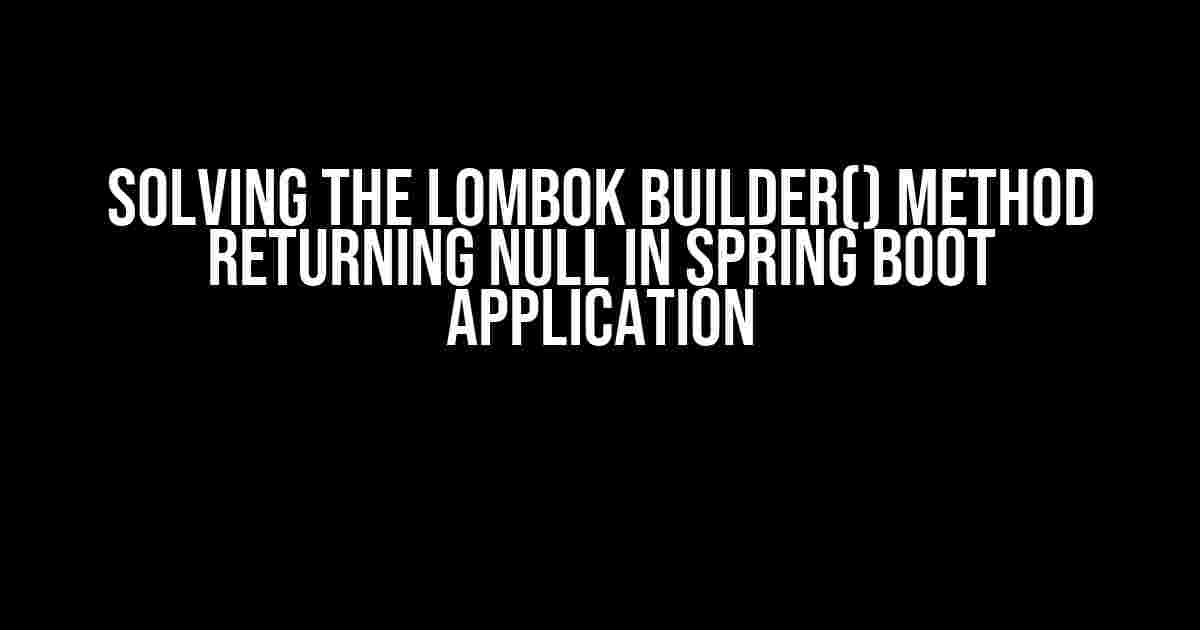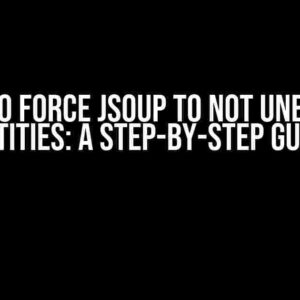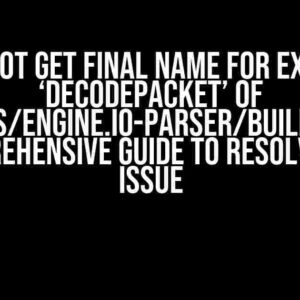Are you tired of dealing with the Lombok builder() method returning null in your Spring Boot application? Well, you’re not alone! Many developers have faced this frustrating issue, but don’t worry, we’ve got you covered. In this article, we’ll dive into the root causes of this problem and provide you with a step-by-step guide to solve it once and for all.
What is Lombok?
Lombok is a popular Java library that reduces boilerplate code and makes your code more concise and readable. It’s widely used in Spring Boot applications to simplify the development process. Lombok provides various annotations, such as @Data, @Getter, @Setter, and @Builder, to automatically generate getter, setter, and builder methods for your Java classes.
The Problem: Lombok builder() method returning null
The Lombok builder() method is used to create a builder instance for a Java class. However, in some cases, the builder() method might return null, causing errors and exceptions in your Spring Boot application. This issue can occur due to various reasons, including:
- Incorrect Lombok configuration
- Missing or incorrect dependencies
- Incompatible Java version
- Annotations not recognized by Lombok
Step 1: Check Lombok Configuration
The first step is to verify that you have correctly configured Lombok in your Spring Boot application. Make sure you have added the Lombok dependency to your pom.xml file (if you’re using Maven) or your build.gradle file (if you’re using Gradle).
<dependency> <groupId>org.projectlombok</groupId> <artifactId>lombok</artifactId> <version>1.18.20</version> <scope>provided</scope> </dependency>
If you’re using Gradle, add the following line to your build.gradle file:
compileOnly 'org.projectlombok:lombok:1.18.20'
Step 2: Check Dependencies
Next, ensure that you have all the necessary dependencies required by Lombok. Check if you have the following dependencies in your pom.xml or build.gradle file:
- Java 8 or higher
- Spring Boot 2.3.0 or higher
- Lombok 1.18.20 or higher
Step 3: Verify Java Version
Lombok requires Java 8 or higher to function correctly. Make sure you’re using a compatible Java version. You can check your Java version by running the following command in your terminal:
java -version
If you’re using an older Java version, upgrade to a compatible version and try again.
Step 4: Enable Lombok Annotations
Sometimes, Lombok annotations might not be recognized by the compiler. To enable Lombok annotations, add the following lines to your pom.xml file (if you’re using Maven):
<build>
<plugins>
<plugin>
<groupId>org.projectlombok</groupId>
<artifactId>lombok-maven-plugin</artifactId>
<version>1.18.20</version>
<configuration>
<source>1.8</source>
<destination>1.8</destination>
</configuration>
</plugin>
</plugins>
</build>
If you’re using Gradle, add the following lines to your build.gradle file:
compileJava {
sourceCompatibility = 1.8
targetCompatibility = 1.8
}
Step 5: Inspect Your Code
Now, let’s take a closer look at your Java code. Make sure you’re using the correct Lombok annotations. Here’s an example of a Java class with Lombok annotations:
@Data
@Builder
public class User {
private String name;
private int age;
}
In this example, the @Data annotation generates getter and setter methods, while the @Builder annotation generates a builder method. Make sure you’re using the correct annotations for your use case.
Step 6: Clean and Rebuild Your Project
Sometimes, cleaning and rebuilding your project can solve the issue. Try cleaning your project and rebuilding it to ensure that all dependencies are correctly resolved.
Common Pitfalls to Avoid
Here are some common pitfalls to avoid when using Lombok in your Spring Boot application:
| Pitfall | Solution |
|---|---|
| Incorrect Lombok version | Use the latest Lombok version compatible with your Spring Boot version |
| Missing dependencies | Verify that you have all the necessary dependencies required by Lombok |
| Incompatible Java version | Use a compatible Java version (Java 8 or higher) |
| Incorrect Lombok configuration | Verify that your Lombok configuration is correct and enable Lombok annotations |
Conclusion
In this article, we’ve covered the common causes of the Lombok builder() method returning null in Spring Boot applications and provided a step-by-step guide to solve this issue. By following these steps, you should be able to resolve the problem and use Lombok effectively in your Spring Boot application. Remember to check your Lombok configuration, dependencies, Java version, and code to ensure that everything is correct. Happy coding!
Additional Resources
If you’re still facing issues, try checking out the following resources:
- Lombok official documentation: https://projectlombok.org/
- Spring Boot official documentation: https://spring.io/projects/spring-boot
- Stack Overflow: https://stackoverflow.com/
By following this guide and using these resources, you should be able to solve the Lombok builder() method returning null issue in your Spring Boot application.
Frequently Asked Question
Are you tired of getting stuck with the Lombok builder() method returning null in your Spring Boot application? Don’t worry, we’ve got you covered! Here are some frequently asked questions and answers to help you troubleshoot and resolve this issue.
Why is my Lombok builder() method returning null?
One common reason for this issue is that Lombok’s annotation processor is not enabled in your project. Make sure you have the Lombok dependency in your pom.xml file (if you’re using Maven) or your build.gradle file (if you’re using Gradle). Also, ensure that your IDE has annotation processing enabled. If you’re still facing issues, try cleaning and rebuilding your project.
How do I enable Lombok’s annotation processor in my Spring Boot project?
To enable Lombok’s annotation processor, you need to add the following dependency to your pom.xml file (if you’re using Maven): `
Why does my Lombok builder() method work in one class but not in another?
This could be due to the fact that Lombok’s annotation processor only works on classes that have the `@Data`, `@Getter`, `@Setter`, `@ToString`, or `@EqualsAndHashCode` annotations. Make sure the class where the builder() method is not working has one of these annotations. If it does, try reordering the annotations or removing unnecessary ones. Also, check if there are any other annotations or configuration that might be conflicting with Lombok’s annotation processor.
How can I debug Lombok-related issues in my Spring Boot application?
To debug Lombok-related issues, you can enable debug logging for Lombok by adding the following VM option: `-Dlombok.log.level=DEBUG`. You can also enable annotation processing logging in your IDE. For Eclipse, go to Project > Properties > Java Compiler > Annotation Processing, and check the “Enable project specific settings” checkbox. Then, click on the “Annotations” button and enable “Verbose” logging. For IntelliJ IDEA, go to Settings > Build, Execution, Deployment > Compiler > Annotation Processors, and check the “Verbose boot loader” checkbox.
Can I use Lombok’s builder() method with Java records?
No, Lombok’s builder() method is not compatible with Java records. Java records are a new feature in Java 16 that provides a concise way to declare classes that contain only immutable data. Lombok’s builder() method is designed to work with classes that have a no-arg constructor, which is not the case with Java records. However, you can use Lombok’s `@Value` annotation on a record class to generate a builder for it. This requires Lombok 1.18.24 or later.





